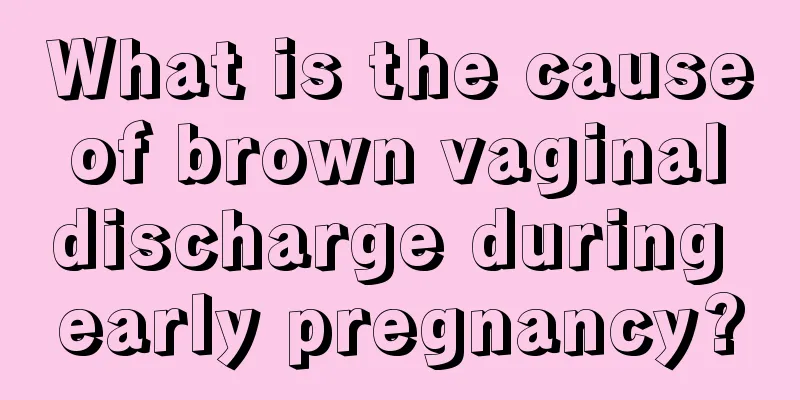What causes hair loss during breastfeeding?

|
Many female friends have black and shiny hair, but after pregnancy and childbirth, when they enter the breastfeeding period, their hair changes, starts to turn yellow and has varying degrees of hair loss. In medicine, this type of hair loss has a special name, called "postpartum hair loss." This type of hair loss troubles breastfeeding women because they cannot take medicine casually. So what is the reason for hair loss during breastfeeding? Postpartum hair loss occurs because hair, like other tissues, also undergoes metabolism. Generally speaking, a person's hair needs to be replaced every five years, but because hair is usually renewed in stages and batches, it is not easy for people to notice that the speed of women's hair renewal is related to the estrogen level in the female body. When the estrogen level is high, the hair renewal rate will slow down; when the estrogen level is low, the hair renewal rate will speed up. During pregnancy, women's pituitary gland, the "housekeeper" of the body's endocrine system, will gain physiological fat. Under its influence, pregnant women secrete more estrogen than usual. In this way, the lifespan of hair is extended, the rate of hair loss is slowed down, and a large amount of hair is "overserved". After childbirth, the estrogen level in the body returns to normal, and those "overserved" hairs "retire" one after another, resulting in postpartum hair loss. In addition, postpartum hair loss is also clearly related to mental factors. Some women "favor sons over daughters" and hope to have a boy. Once they give birth to a girl, they become depressed and unhappy. Some are also due to other adverse mental stimulation, which leads to dysfunction of the cerebral cortex, autonomic nervous system, and nerves controlling the blood vessels in the scalp, reducing blood supply to the scalp, resulting in malnutrition and hair loss. Some women have a monotonous diet during pregnancy that cannot meet the nutritional needs of the mother and fetus. Being picky and partial in food during the postpartum and breastfeeding period can cause malnutrition and make hair break and fall out easily. Since postpartum hair loss is related to the amount of estrogen in the body, can estrogen be taken to prevent and treat postpartum hair loss? This is not right First, the hormone secretion in the body has its own rules. Taking estrogen can easily disrupt the political state of hormones in the body and affect its physiological functions. Second, estrogen can be secreted with breast milk. Taking too much estrogen will affect the normal development of the baby. So, how can we prevent or reduce postpartum hair loss? First of all, women during pregnancy and lactation should keep comfortable and optimistic during the day, and avoid the occurrence of negative emotions such as tension, anxiety, fear, etc. Second, pay attention to a balanced diet and eat more fresh vegetables, eggs, seafood, beans, eggs, etc. to meet the nutritional needs of the body and hair. Third, frequently combing your hair with a wooden comb, or rhythmically massaging your scalp with your fingers can stimulate the scalp, which can promote blood circulation in the scalp and benefit the metabolism of the hair. Washing your hair frequently can remove the grease and dirt on the scalp, keep the scalp clean, and promote new hair growth. Fourth, under the guidance of a doctor, taking some vitamin B1, oryzanol and calcium tablets after delivery can also be beneficial for postpartum hair loss in children. If you experience postpartum hair loss, don't panic. You can take vitamin B6 or blood-nourishing capsules. Regularly applying ginger slices to the areas of hair loss can promote hair growth. Postpartum hair loss can usually be recovered after 6-9 months and hair will grow again. Through the above introduction, we know the causes of postpartum hair loss, and also know how to prevent and reduce this hair loss. After knowing the cause, we can take preventive measures. As long as breastfeeding women keep a happy mood, avoid negative emotions, and pay attention to their eating habits, this kind of hair loss can be avoided. |
<<: What aspects should be checked for uterine cysts?
>>: What tests should be done during pregnancy?
Recommend
What are the symptoms of uterine cold?
Female friends need to improve their health aware...
How long does it take for a cesarean section incision to heal?
Giving birth naturally is quite painful for pregn...
Is anesthesia necessary for a normal birth?
I believe everyone knows that women will feel a l...
What are the early symptoms of liver cancer? If you have these symptoms, it may be liver pain
The liver is an extremely important organ in our ...
How much does it cost for pregnant women to do non-invasive DNA
For some pregnant women, when they go to the hosp...
Can my aunt dye her hair?
Menstruation is a relatively normal physiological...
What are the benefits of drinking brown sugar water after miscarriage
Some women suffer miscarriages due to physical re...
Can I eat fennel during my period?
Once women enter their menstrual period, they wil...
Does oral lichen planus mean "moss" growing in the mouth?
If one day you feel astringent and painful sensat...
Is it normal to feel granules on the cervix?
The uterus is an extremely important part for wom...
How to comb your hair to look good
Girls all love to be beautiful. You said that I h...
Symptoms of menopausal depression, it turns out women suffer so much!
Many people complain that women in menopause have...
What to do if couples have dry sex during menopause
The most specific manifestation of the arrival of...
What does it mean when a girl drinks the water you drank? Does it mean that a girl likes me when she drinks the water I drank?
In life, there are many opportunities to meet the...









